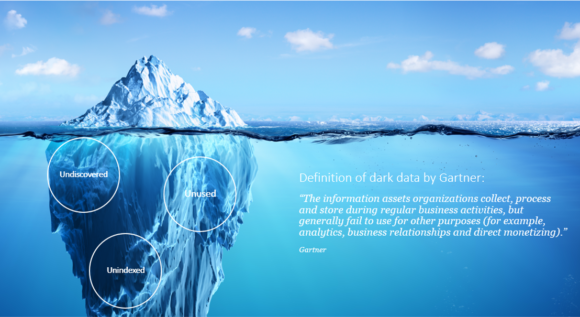Companies’ data is out of control
Companies are piling up mountains of data every day. While everyone is aware of the importance of proper data management for the success of their business in the Age of Data, various studies show that a large majority of data governance, analytics, and AI initiatives fail, with tremendous investments down the drain. The application of the newest data management tools, business intelligence solutions, methodologies, and some small AI initiatives will not make you a data hero. Only if you utilized it properly, will you make the most of it.
Dark data, siloed data, irrelevant data, outdated data, wrong data, sensitive data
Where is the relevant data? Is it in one of your systems or on the desktop of an employee? In one of the dozens of SharePoint folders? In an email? This is where the problems begin: data resides in silos without being used for any insights into the information it obtains. Gartner describes it as dark data, and its amount is growing tremendously each and every day. Visible or not, assuming we could access all the data, how does one know which information is relevant and accurate? How does it become valuable?
Figure 1: Definition of dark data by Gartner
Unlock your data with Intelligent Data Management and Data Science & Analytics
As the initial step to finding an answer to these questions, companies must be able to activate, transform, and manage their data across often historically grown, complex data landscapes. Data cataloging is necessary to handle both structured and unstructured data, and there is a need for a repository to serve this purpose. Solutions, such as data lakes, achieve this goal and support upcoming, value-adding workloads by being able to store different types of data in the same repository, perform transformations and facilitate data discovery steps.
A key point to fully understand, why intelligent data management is a must-have, is the realization that data is not meant to be treated as inventory like old master data in a MDG system. Instead, it should be treated in a comprehensive way. The potential of great value is not just found within a MDG system, but also inside countless files created from applications or operational transactions, or even in dark data. Here, you might for example uncover insights on how your company reacted to some legislative change and implemented coping measures and improved the whole process along the way.
Data Science – foundation for value-adding activities
While understanding and cataloging data is already a great achievement, it is not a value-generating activity in and of itself but rather serves as the foundation for all value-adding activities. One way to activate your data is with Data Science (DS). DS offers almost endless possibilities in shedding light on dark data, paving the way for generating business value out of existing data with the use of Machine Learning (ML). By structuring and understanding dark data, it can all be converted into one easy-to-understand output, like a daily report, or lay the foundation for future decisions powered by predictive analytics.
As these steps build upon each other, focusing on a single part or gaining expertise in only some of the specific areas will not lead to success. Having only perfectly structured data but lacking expertise in the other areas will never yield as much value as having balanced expertise in all areas. This is where holistic data management and data intelligence come into play. It encapsulates many processes from understanding to controlling, and from securing to governing your data. Holistic data management gives you the control and visibility of your data and data Intelligence allows you to unlock its potential.
Join us on a value journey through the #ageofdata
The #ageofdata series is here to clarify and demystify all the buzz around data, the cloud, ML concepts, and how to make your data work for you. One thing is crystal clear: data is not meant to be just stored, data is a strategical asset and should be treated as such.
The goal of the #ageofdata series is to explain the data toolkit and strategies needed to turn your data into assets and even revenue in simple words and with practical examples. At the core of this series lies a clear business need for data understanding and processing, matched with extensive knowledge of technical solutions. The #ageofdata series acts as a bridge between business, data, and technology and aims to provide the reader with a general understanding of what type of solution would work for them.
We will take you on a journey with different paths and many interesting challenges along the way. One path will lead you through the usability of Holistic Data Management in the business context, like business needs, roles, use cases, etc., while another path will take you into the technical depths with walkthroughs and deep dives as practical tutorials on topics such as cloud and neural networks. At the end of the day, all the paths will get you one step closer to data-driven leadership. This journey will provide guidance through challenges and lead to a successful future where “data-driven” is no longer just a slogan.
Stay tuned for the next blog posts in #ageofdata


